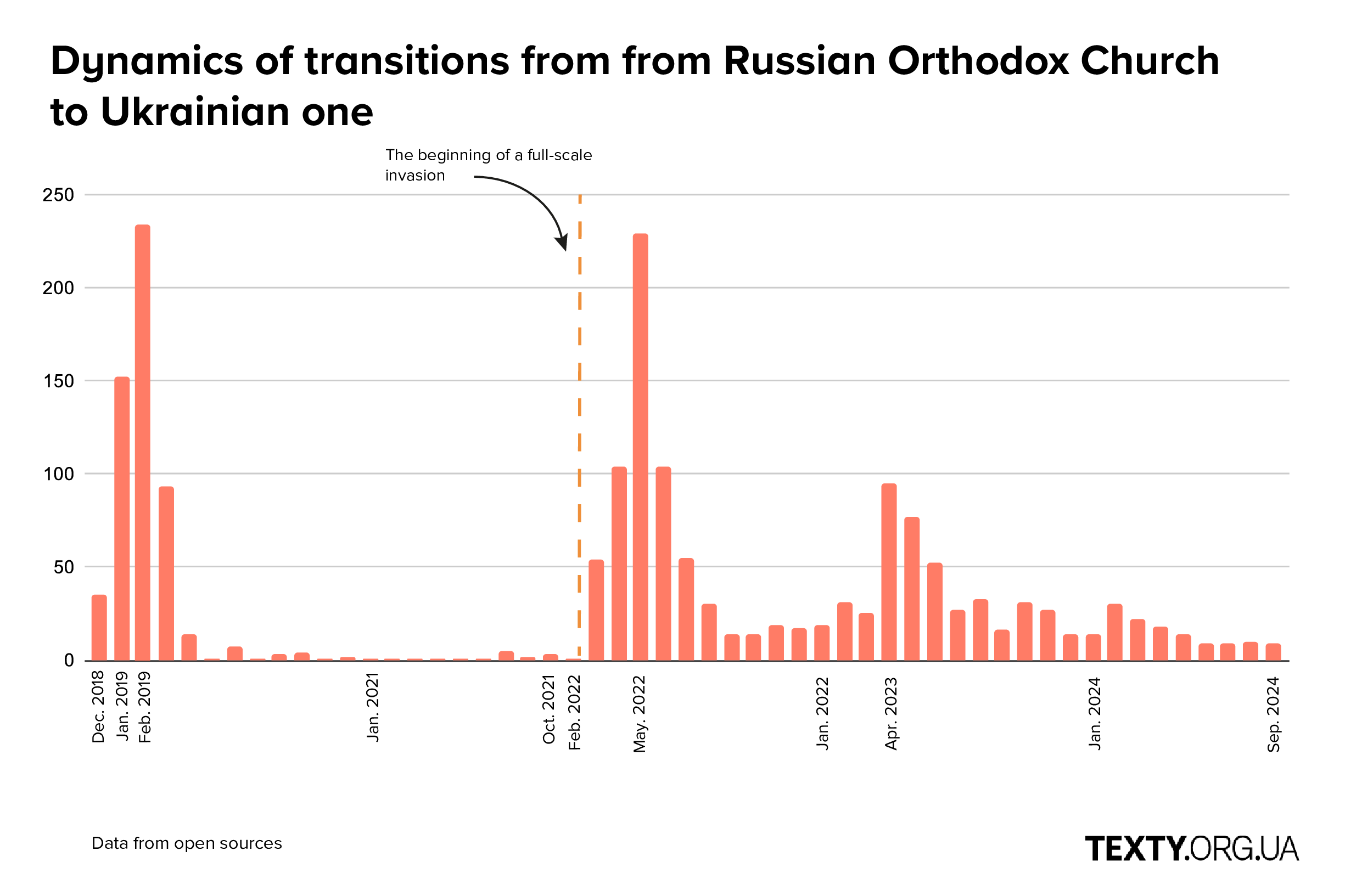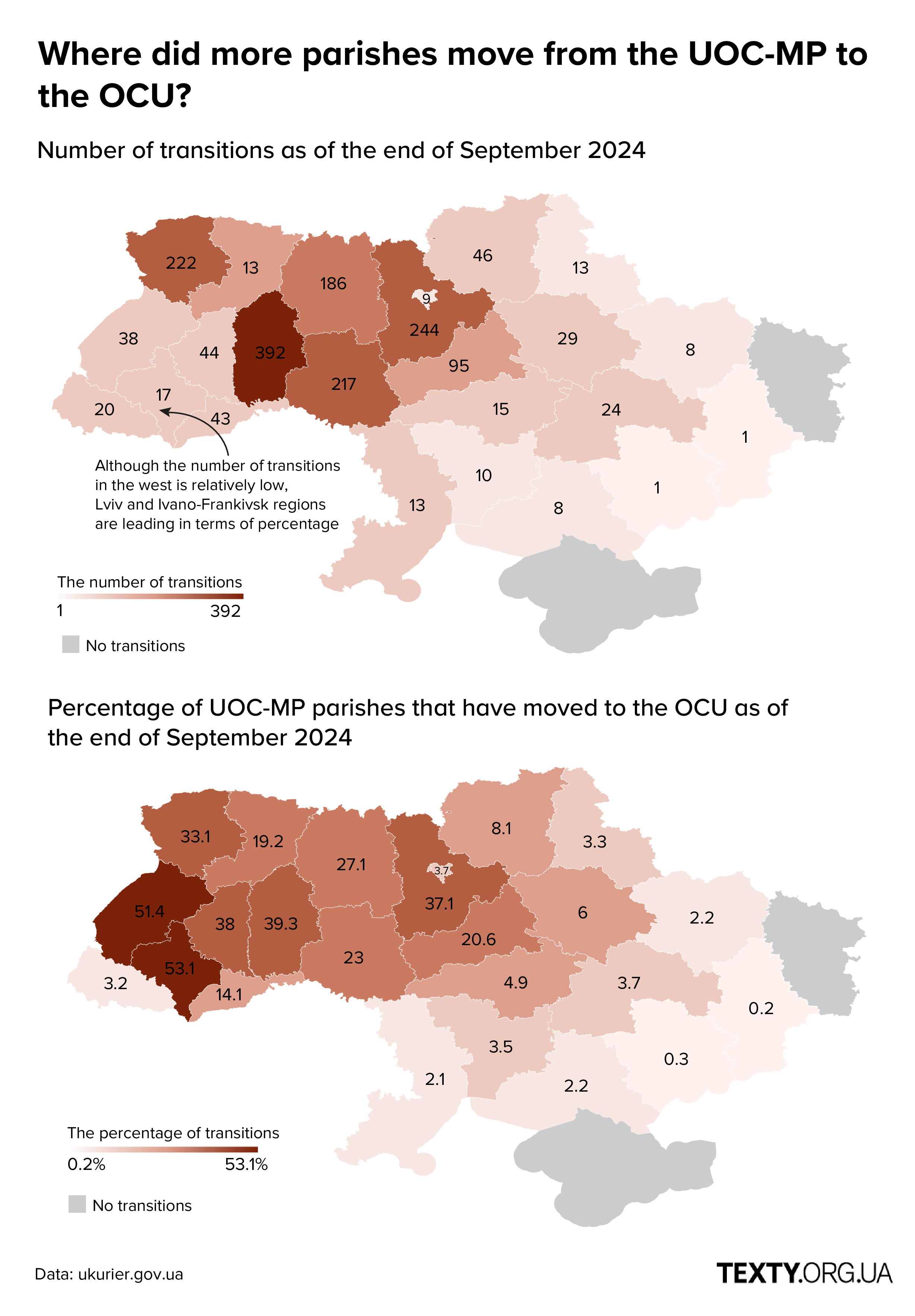Why did communities stop moving from Russian Orthodox Church to Ukrainian one, and will the new law change this?
Over the past month, only nine parishes have moved from Russian Orthodox Church to Ukrainian one, significantly less than two years ago. What are the reasons for this phenomenon, and will the new law banning the Russian Orthodox Church in Ukraine change anything? Read in our article.
To find out what influences parish transitions, we talked to a religious scholar and professor of the Department of History at the National University of Ostroh Academy, Andrii Smyrnov. Here is his direct speech:

In general, there are several spikes in transitions from the UOC-MP to the OCU. They are associated with certain events or triggers, such as the granting of the Tomos in 2019. The first wave lasted about three months.
UOC-MP is a Ukrainian Orthodox Church of the Moscow Patriarchate (UOC-MP), part of Russian Orthodox Church that spreads its narratives and propaganda.
OCU is Ukrainian Orthodox Church with its centre in Kyiv.
A new motive force was the full-scale Russian invasion in 2022. But now, the potential for mass transitions has been exhausted. All the parishes of the UOC-MP cannot move to the OCU, this will never happen because Ukraine is very different.
For example, the largest number of transitions took place in western Ukraine, with Khmelnytsky region now leading the way. It was the largest region where the UOC-MP parishes were distributed, and unlike Volyn, there were almost no transitions to the Kyiv Patriarchate (we are talking about the UOC-KP, an independent Ukrainian Orthodox Church that existed before the OCU and was not recognized by other Orthodox churches - ed.)
This is because there were almost no transitions in the Khmelnytsky region until 2022. That is, this energy, this potential, has to be released. But if we look at the center, south, or east, there are still almost no transitions, as there is no potential for this.

Will the new law change anything?
In connection with the entry into force of the new church law, there may be another surge in transitions, but it will be small. There are already the first priests, for example, Father Vasyl Levchenko from the Chernivtsi region, who joined the OCU but without a parish. So this is also somehow connected with the entry into force of the new law.
The second important point is that in two months, the contracts for the use of religious buildings that were leased to the UOC-MP by local councils will be terminated, and the communities will face a choice: either they will lose the opportunity to use these monuments, or they will move to the Orthodox Church of Ukraine. I do not exclude the possibility that some parishes will indeed decide to move to the OCU, keep the church, and continue to pray there.
Obstacles to the transition
There are no problems with the transition, because there is an appropriate legal framework, and the new law even simplifies these procedures. Moreover, if earlier monasteries were not able to change their canonical subordination, now even they can move to the OCU by making a decision at their general meeting. However, there are some unfavorable factors that affect transitions.
Who has the right to vote?
The key obstacle now is the problem with so-called membership. The state cannot determine who is a member of a particular parish; the community itself must have this register.
But there is a nuance: the Orthodox Church has no obligation to keep this register, and some parishes have it, and some do not. Thus, it is almost impossible to determine who has the right to vote for or against the transition. Some say that the entire village community should vote because the territorial criterion is important. Others believe that only permanent parishioners recognized by the rector have the right to vote.
In urban areas, it is even more difficult to determine who is a regular member and attends church regularly. On this basis, conflicts arise over who can vote at general meetings and who does not. Then the UOC-MP exploits this gap and goes to court to challenge the transition to the OCU. But the courts usually support the decision of the community to change their jurisdiction.
It would be good if the parishes had approved lists of parishioners, which would simplify the transition. But there is a danger of using these lists to block transitions. For example, a priest can draw up a list of his close associates - relatives, elders, choir members, etc. - and declare that these people are community members. And 200 people who more or less regularly attend church on holidays have no right to vote.
Priests do not support their communities
There is also a problem when priests do not support the decision of their faithful to change their canonical subordination. This leads to a split in the community between supporters of the OCU and the UOC-MP. Most of the 1500 parishes were left without a priest. Then the OCU appoints a new rector. At the same time, the UOC-MP community, led by the former rector, continues to operate without state registration.
If dioceses and bishops joined the OCU, we would indeed see a mass movement. Ordinary parish priests are afraid of bishops and do not want to act independently. Not a single bishop of the UOC-MP has joined the OCU in five and a half years.
In addition, an important factor why priests and believers do not move to the OCU is the prejudice that the OCU is graceless (i.e., without God's grace, and belonging to such a church does not guarantee salvation after death, which is important for believers) and a schismatic structure.
Despite the existence of the Tomos and the recognition of the church by the Ecumenical Patriarchate, Moscow's propaganda has been working for a very long time to create this image of the OCU. People believe in this "schism" and do not want to go there.
There is still a negative image of the OCU created, in particular, by pro-Russian church or church-related media resources, such as the Union of Orthodox Journalists, First Cossack, or anonymous telegram channels.
Physical confrontation
Unfortunately, transitions are sometimes accompanied by physical confrontation over property issues. This can create a negative image of the OCU as a "church with a grinder." It is the grinder that has become a symbol of these transitions, but the grinder is not to blame here, nor are those who use it. Sometimes, it is impossible to get into a church in a civilized manner - the doors are locked, and the priest does not give the keys, although the majority of the community has decided to move to the OCU, and sometimes this is even confirmed by the court.
The grinder is not to blame, nor are those who use it
After all, the law allows for alternate worship, for example, it is possible to determine the hours or days when services of the OCU and the UOC-MP will be held. Despite the fact that Metropolitan Onufriy Berezovsky does not support this practice, there are cases when parishioners find a compromise and hold services in turn. This greatly minimizes the violence and finds a way out, at least temporarily.
Priests fear community split
Priests fear a split in their community. They see a confrontation between supporters of the OCU and the UOC-MP. Therefore, as long as a priest serves within the UOC-MP, the community is more or less united; as soon as the priest supports the majority or minority in favor of joining the OCU, the community may split. Church rectors want this choice to be unanimous, but this is impossible. Therefore, they expect church-wide decisions.
Fans of the "Russian world"
There are still many pro-Russian bishops in Ukraine, such as Anthony Pakanych (Anthony Pakanych has been a sanctioned person in Ukraine since December 2022 and a person of interest on the Myrotvorets website for spreading Russian propaganda - Ed.), Feodosiy Snigirev, Luka Kovalenko.
They do not hide the fact that they support Russia, pray for Patriarch Kirill, and will never join the OCU, and their dioceses, respectively. As we have already noted, this is why many priests do not move to the OCU because they depend on the position of their bishops.
Most of the bishops of the UOC-MP were brought up in a certain Russian church matrix. They studied somewhere in Russia, had friends there, and perhaps were waiting for Putin to come to Ukraine in 2022. Now, of course, Ukraine has withstood, and they have quieted down, not demonstrating all this pro-Russianism.
Of course, there is a pro-Ukrainian minority among the bishops, but it is not independent. Metropolitan Onufriy is an influential person who guides this minority. Now, there is no alternative to Metropolitan Onufriy who could lead this pro-Ukrainian part of the UOC-MP.
These bishops probably sympathize with Ukraine and pray for our soldiers quietly. They are not ready to move to the OCU on their own because, again, they know that they will lose their diocese. If a particular diocese moves to the OCU, a new bishop will be appointed immediately. Most parishes will follow the new bishop because they recognize Onufriy's authority.
He is indeed an authority for many bishops, priests, and believers, and his position is known — to wait and wait for the war to end. He does not make sudden moves, and this passive position irritates many people. But he will not seek rapprochement with the Ecumenical Patriarchate and the OCU because of his specific church beliefs.

